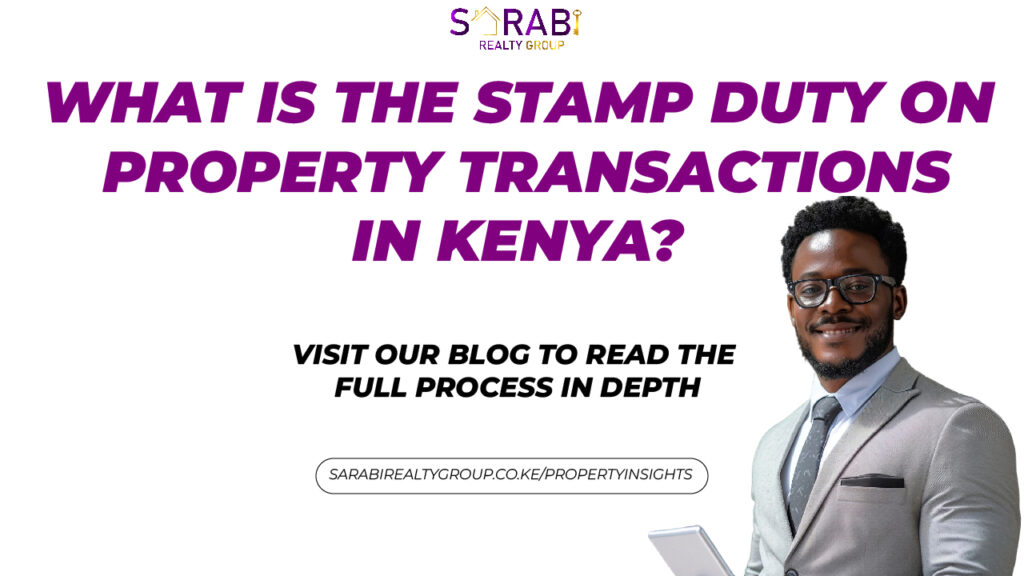WHAT IS THE STAMP DUTY ON PROPERTY TRANSACTIONS IN KENYA?
Stamp duty is often overlooked when it comes to property transfers. However, it represents a significant sum of money when acquiring real estate.
In Kenya, when you buy a house or make a property transaction, you must pay something called “stamp duty.” It’s similar to a tax charged by the government when you transfer property from one individual to another.
Let’s look at what stamp duty is, who pays it, how much it costs, and what you should know about it.

What is stamp duty?
Stamp duty is a tax levied when you transfer property. It applies to written documents transferring ownership of land and buildings. This includes both residential and non-residential properties, such as vacant land.
The amount of stamp duty you pay is determined by the value of the property.

ALSO READ: Why You Need A Real Estate Agent
Who Pays Stamp Duty?
If you buy a site with an agreement to build a house on it, you must pay stamp duty at the residential property rate. If you buy a site without plans to build, you pay at the non-residential property rate. The buyer is responsible for paying stamp duty, and it’s important to consider this cost when making property transactions.
How much is stamp duty?
Stamp duty is 4% for properties within municipalities (cities and major towns), and 2% for properties outside municipalities (upcountry). For example, if you buy a house for Ksh10 million, you must pay Ksh400,000 in stamp duty if the property is located within a municipality.

Stamp Duty Exemptions
Some transactions are exempt from stamp duty, so you don’t have to pay it.
These exemptions include:
- Transfers to charitable organizations
- Transfers between spouses.
- Transferring family property after the death of a family member
To save money, you should be aware of these exemptions.
ALSO READ: THE BEST ESTATES TO LIVE IN IN NAIROBI KENYA
How To Pay Stamp Duty in Kenya
You can pay stamp duty using the iTax portal, which is an online platform provided by Kenya Revenue Authority.
- Log in to the iTax portal and select “Payment Registration.”
- Select “Agency Revenue” as the tax heading and “Stamp Duty” as the subhead.
- Under payment type, choose “Self-Assessment” and then payment registration.
- Enter the Bill Reference Number (Transaction Reference Number).
- Select the appropriate type of instrument from the drop down list.
- Then enter the seller (transferor) and buyer (transferee) information.
- Select the appropriate type of instrument from the drop down list.
- Then enter the seller (transferor) and buyer (transferee) information.
- Enter the “Declared value”, “Date of Instrument”, and “Tax rate” in the Stamp Duty obligation details.
- To generate the payment slip, select the mode of payment and click the submit button. After that, make the payment via bank transfer or Mpesa using paybill number 572572.

ALSO READ: Why You Should Consider The Air Bnb Business…
Important Notes.
The stamp duty must be paid within 30 days of the property transaction. If you fail to pay on time, the transaction is rendered invalid, and any agreements made are no longer legally binding. Additionally, there are penalties for late payment, so it is critical to meet the deadline.
In conclusion, understanding stamp duty is critical when purchasing or selling property in Kenya. It is a legal obligation, and failure to comply can result in serious consequences. Knowing the rates, exemptions, and payment procedures will help you ensure a smooth property transaction and avoid unnecessary complications.





